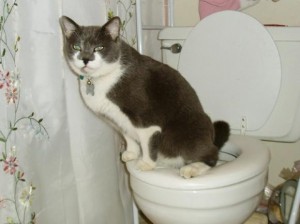Potential Issues of Flushing Cat Poop Down Your Toilet - Safeguard Your Pipes
Potential Issues of Flushing Cat Poop Down Your Toilet - Safeguard Your Pipes
Blog Article
They are making a number of good pointers relating to How to Dispose of Cat Poop and Litter Without Plastic Bags overall in this article followed below.

Intro
As cat owners, it's essential to be mindful of just how we get rid of our feline close friends' waste. While it may seem practical to flush pet cat poop down the bathroom, this method can have harmful consequences for both the environment and human wellness.
Environmental Impact
Purging feline poop presents damaging virus and bloodsuckers into the supply of water, posing a significant danger to aquatic ecological communities. These pollutants can adversely influence marine life and concession water high quality.
Wellness Risks
Along with ecological problems, flushing cat waste can also present wellness dangers to humans. Cat feces might contain Toxoplasma gondii, a bloodsucker that can trigger toxoplasmosis-- a potentially serious ailment, particularly for expecting females and individuals with damaged body immune systems.
Alternatives to Flushing
Luckily, there are more secure and extra accountable methods to dispose of cat poop. Think about the complying with alternatives:
1. Scoop and Dispose in Trash
The most common method of throwing away pet cat poop is to scoop it into a naturally degradable bag and toss it in the garbage. Make sure to make use of a dedicated trash inside story and deal with the waste quickly.
2. Use Biodegradable Litter
Go with eco-friendly cat litter made from materials such as corn or wheat. These litters are environmentally friendly and can be safely taken care of in the garbage.
3. Hide in the Yard
If you have a backyard, take into consideration burying cat waste in a designated area far from veggie yards and water resources. Make sure to dig deep sufficient to avoid contamination of groundwater.
4. Mount a Pet Waste Disposal System
Invest in a family pet garbage disposal system especially designed for cat waste. These systems use enzymes to break down the waste, decreasing odor and ecological influence.
Verdict
Responsible animal possession expands past giving food and sanctuary-- it additionally includes appropriate waste monitoring. By refraining from purging pet cat poop down the bathroom and opting for different disposal methods, we can reduce our ecological footprint and shield human health.
Why You Should Never Flush Cat Poop Down the Toilet
A rose by any other name might smell as sweet, but not all poop is created equal. Toilets, and our sewage systems, are designed for human excrement, not animal waste. It might seem like it couldn’t hurt to toss cat feces into the loo, but it’s not a good idea to flush cat poop in the toilet.
First and foremost, assuming your cat uses a litter box, any waste is going to have litter on it. And even the smallest amount of litter can wreak havoc on plumbing.
Over time, small amounts build up, filling up your septic system. Most litter sold today is clumping; it is made from a type of clay that hardens when it gets wet. Ever tried to scrape old clumps from the bottom of a litter box? You know just how cement-hard it can get!
Now imagine just a small clump of that stuck in your pipes. A simple de-clogger like Drano isn’t going to cut it. And that means it’s going to cost you big time to fix it.
Parasitic Contamination
Believe it or not, your healthy kitty may be harboring a nasty parasite. Only cats excrete Toxoplasma in their feces. Yet it rarely causes serious health issues in the cats that are infected. Most people will be fine too if infected. Only pregnant women and people with compromised immune systems are at risk. (If you’ve ever heard how women who are expecting are excused from litter cleaning duty, Toxoplasma is why.)
But other animals may have a problem if infected with the parasite. And human water treatment systems aren’t designed to handle it. As a result, the systems don’t remove the parasite before discharging wastewater into local waterways. Fish, shellfish, and other marine life — otters in particular — are susceptible to toxoplasma. If exposed, most will end up with brain damage and many will die.
Depending on the species of fish, they may end up on someone’s fish hook and, ultimately on someone’s dinner plate. If that someone has a chronic illness, they’re at risk.
Skip the Toilet Training
We know there are folks out there who like to toilet train their cats. And we give them props, it takes a lot of work. But thanks to the toxoplasma, it’s not a good idea.

I came across that page on Don’t flush cat feces down the toilet when doing a lookup on the search engines. Appreciated our write up? Please share it. Help somebody else locate it. Thanks a lot for taking the time to read it.
Book An Appointment Report this page